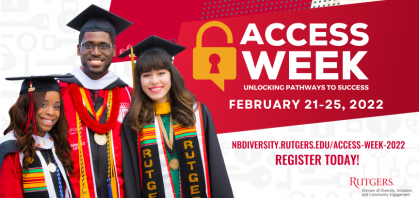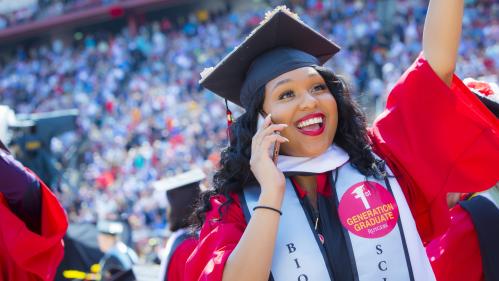Week’s events culminate around “Enacting Beloved Community” theme
Led by the Division of Diversity, Inclusion and Community Engagement, Rutgers–New Brunswick will host its ninth annual Access Week from Feb. 21-25 to champion educational equity and unlock pathways for success for current and prospective first-generation, low-income and other underserved students.
As part of the week-long series of programming, Access Week events showcase the successes of many students during the past year in their return to campus. The week’s theme is “Enacting Beloved Community,” which is prompted by the isolation period due to the COVID-19 pandemic.
"Each student that enters our campuses has a wide range of lived experiences and backgrounds that form their unique identities,” said Tiffiny Butler, associate vice chancellor for educational equity. “Supporting underserved students holistically is how we meet the call to enact a ‘beloved community.’ Access Week is a celebration of how we intentionally work together to embody, reflect and respect the complexity of all of our parts enabling students to thrive."
The Educational Equity Group (EEG) in the Division of Diversity, Inclusion, and Community Engagement serves nearly 1,000 students across a range of programs, the majority of whom come from underrepresented backgrounds.
“Higher education has been exclusionary historically and there are practices today that maintain inequities for first-generation, low-income and other underserved student groups,” said Enobong (Anna) Branch, senior vice president for equity at Rutgers. “We have a responsibility to support student success beyond access to the university. Rutgers–New Brunswick has a great track record, but we can always do more. Access Week is an opportunity to center equity-mindedness, to take institutional responsibility for the success of all of our students and to highlight programs that support them."

Butler will collaborate with University of Chicago scholar Micere Keels on Feb. 24 for Equity Mindset, a workshop that will focus on student success strategies, retention and timely degree completion, and how to incorporate the fundamentals of equity into the work.
The Student Research Presentations, scheduled for Feb. 23, will feature presentations by scholars in the Ronald E. McNair Postbaccalaureate Achievement and Louis Stokes Alliance for Minority Participation programs and provide information on how to participate in research opportunities at Rutgers University and beyond. The programs are federally funded initiatives designed to help build a pipeline of undergraduate students for doctoral programs and STEM professions. “Having moments like these where students can stand up and speak confidently about the work provides a glimpse into the future,” said Butler. “It's an important part of professional development to provide that sense of belonging and professional confidence. Additionally, it is an opportunity for students to celebrate the work they have accomplished.”
A two-part Student Success Conference is designed to connect students with alumni professionals to help them with financial aid and financial literacy and equip students with strategies for becoming career ready. Butler said: “The financial literacy component is essential when thinking about generational impact. Understanding financial aspects of what it means to go through college and then get out into the world has the power to change social mobility.”
Davarian Baldwin, the Paul E. Raether Distinguished Professor of American Studies and founding director of the Smart Cities Lab at Trinity College and author of In the Shadow of the Ivory Tower: How Universities are Plundering Our Cities, will deliver the annual James Dickson Carr Lecture on Feb. 23. The lecture is named after Rutgers’ first Black graduate. Baldwin will discuss what role urban universities play in America’s cities, and how the relationship between our cities and universities can be more equitable.
The week will also include a workshop on Feb. 22 with Torie Weiston-Serdan, a Claremont Graduate University scholar and author of Critical Mentoring: A Practical Guide, on how to engage culturally sustaining mentoring practices when working with young adults and how to support underserved students by taking identity into account.
Rutgers–New Brunswick Chancellor-Provost Francine Conway said, “Rutgers–New Brunswick is a national leader in ensuring that all qualified students have the support they need to thrive and succeed. Access Week provides us with the opportunity to reflect on our students’ needs and learn how we can continue building a beloved community that serves the public good through equity in, and access to, higher education.”
Butler noted the week provides an opportunity to become an active part of the community and supports learning to move toward an equitable mindset that helps all students thrive.
Rutgers is a member of the American Talent Initiative (ATI), a coalition of 130 universities nationwide that have pledged to enroll an additional 50,000 lower-income students by 2025. Rutgers has been a top performer among ATI members since its launch during the 2015-2016 academic year. About 25 percent of Rutgers–New Brunswick students receive Pell Grants, making it a national leader among ATI institutions.
Rutgers–New Brunswick’s four-year and six-year graduation rates for all students are 25 percent and 21 percent higher, respectively, than the national average. Rutgers–New Brunswick’s graduation rate for first-generation students is 80 percent. Rutgers–New Brunswick’s graduation rate for Black students is 33 percent higher than the national average, which is 44.3 percent.
Rutgers fosters the success of underserved students through a range of programs, including Rutgers Future Scholars, Rutgers Upward Bound, Scarlet Promise Grants, the New Jersey Equal Opportunity Fund, Student Support Services and a new partnership with Cooperman College Scholars.
Access Week programming highlights civic learning and engagement; faculty research on diversity, equity and inclusion; research presentations from McNair & LSAMP scholars; and student-led discussions of access and equity. For a full list of events, visit https://nbdiversity.rutgers.edu/access-week-2022.
